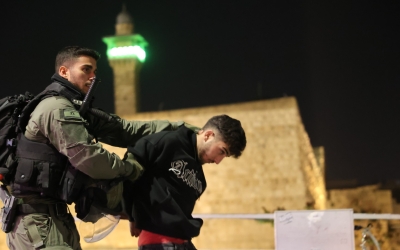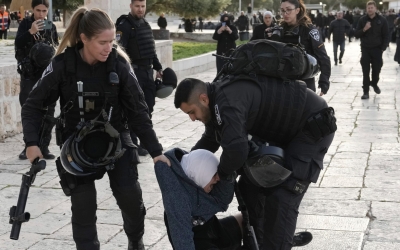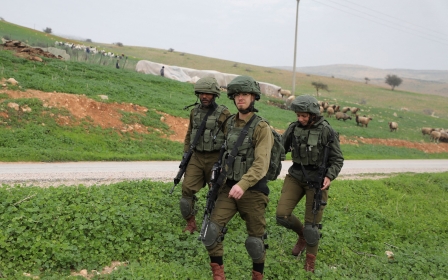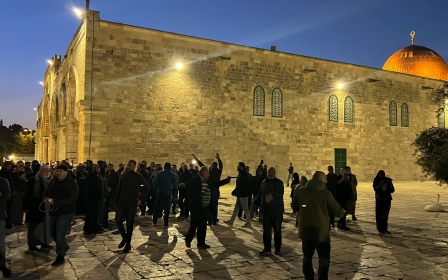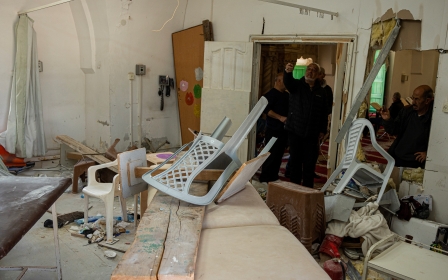Why did Israel attack worshippers at Al-Aqsa Mosque?
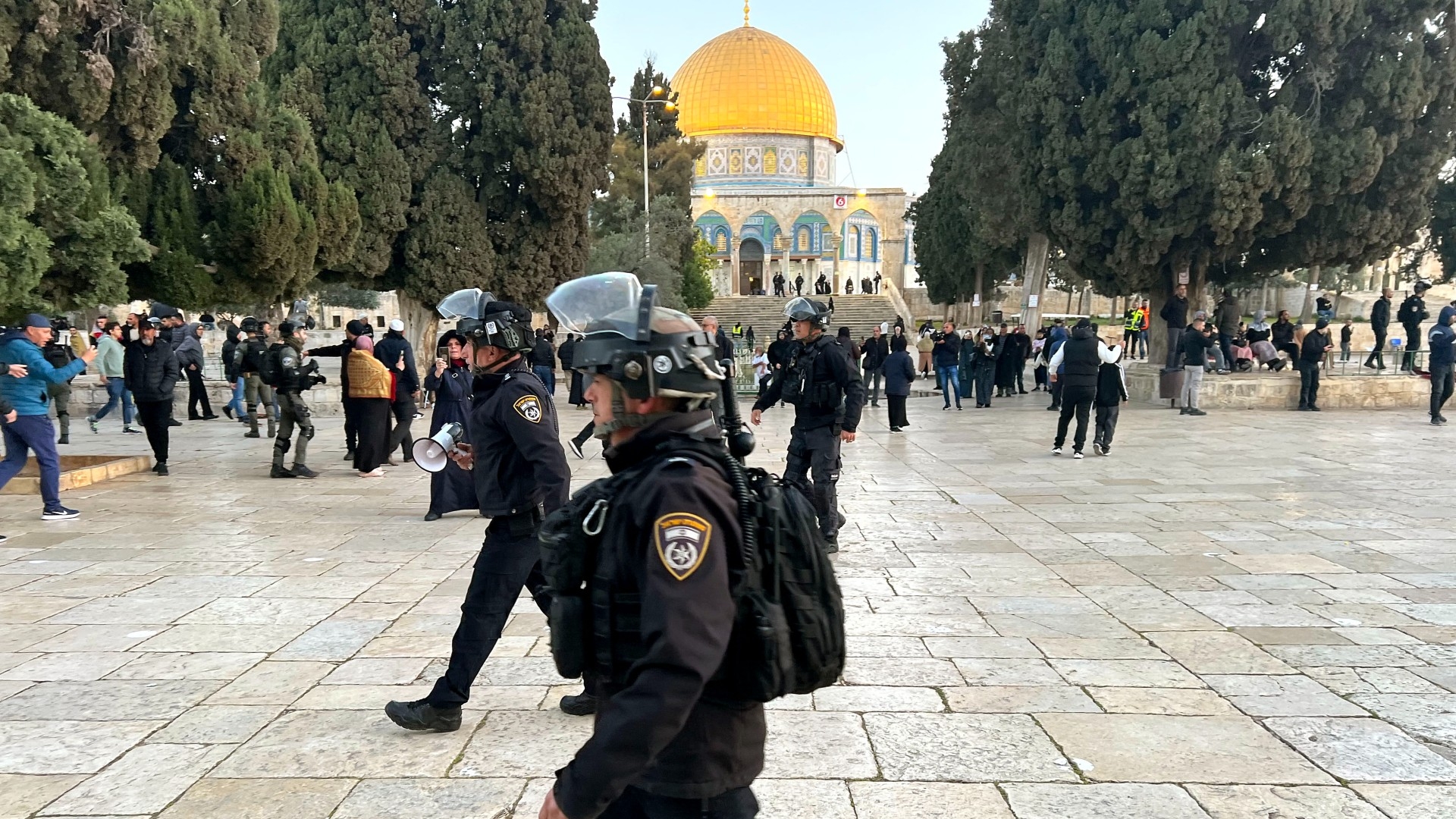
Israeli forces stormed Al-Aqsa Mosque in occupied East Jerusalem over two successive nights this week, assaulting and arresting worshippers, sparking global condemnation.
On Tuesday night, dozens of heavily armed officers raided the site, using stun grenades and firing tear gas into the Qibli prayer hall, where hundreds of worshippers were staying overnight to pray.
Israeli troops beat worshippers with batons and riot guns, injuring dozens, before arresting several hundred.
Twenty-four hours later, armed officers again stormed the mosque while around 20,000 Palestinian worshippers were performing nightly Ramadan Taraweeh prayers.
They fired rubber-coated bullets, tear gas and stun grenades to clear the mosque, before chasing people and beating them with batons.
So what justification did Israeli authorities give for such violent and brutal actions at Islam’s third holiest site during the holiest month in the Muslim faith?
Crackdown on Ramadan worship
Following the Taraweeh night prayers on Tuesday, dozens of worshippers stayed in Al-Aqsa to practise Itikaf, a non-mandatory religious act that is common during Ramadan and involves staying inside mosques overnight to pray, reflect and recite the Quran.
Israel authorities do not allow worshippers to practise Itikaf outside of the last ten days of Ramadan - a ban Palestinians refuse to comply with.
Israeli officers were first spotted at around 10pm entering Al-Aqsa, where they began removing people from the courtyards.
While those seated in the courtyards were being removed, dozens of other worshippers locked themselves inside the Qibli prayer hall to evade the Israeli crackdown.
The police said it entered the compound because “hundreds of rioters and mosque desecrators barricaded themselves” inside the mosque.
“When the police entered, stones were thrown at them and fireworks were fired from inside the mosque by a large group of agitators,” it said in a statement.
Israel's control of occupied East Jerusalem, including the Old City, violates several principles of international law which stipulates that an occupying power has no sovereignty in the territory it occupies and cannot make any permanent changes there.
“Israel does not want to learn from history, that al-Aqsa is for the Palestinians and for all Arabs and Muslims, and that storming it sparked a revolution against the occupation,” Palestinian Prime Minister Mohammad Shtayyeh said following Tuesday’s raids.
Paving way for settler incursions
Early on Wednesday morning, Israeli forces once again dispersed worshippers and forced them out of the mosque.
This time it was so that the forces could pave the way for Israeli settler incursions, which began at 7am.
Israeli troops regularly empty the mosque of Palestinians outside of the five daily prayers to facilitate these daily incursions.
Temple Movement groups, which advocate for the destruction of Al-Aqsa, have called for mass stormings throughout the week-long Passover holiday, which began on Thursday.
Al-Aqsa Mosque is an Islamic site where unsolicited visits, prayers and rituals by non-Muslims are forbidden, according to decades-long international agreements.
Israeli groups, in coordination with authorities, have long violated the delicate arrangement and facilitated raids of the site and performed prayers and religious rituals.
Jewish ultranationalist groups have this week offered cash rewards to anyone who sacrifices a goat inside Al-Aqsa - a prohibited and highly provocative act.
Najeh Bkeirat, the deputy director of the Islamic Waqf at Al-Aqsa Mosque, said the conduct of police this week appeared to be premeditated.
"The Israeli government seems to have made a decision this year to empty Palestinians from al-Aqsa Mosque and Jerusalem,” he said. “They want only Jews in the city. They don't want Palestinians and Muslims here.”
Palestinians fear that restrictions on when they can enter and the opening of the site to settlers is laying the groundwork for the mosque to be divided between Muslims and Jews, similar to how the Ibrahimi Mosque in Hebron was divided in the 1990s.
Violent Israeli assaults on Palestinian worshippers during the month of Ramadan, specifically, have become commonplace.
Last year, over 170 were wounded and more than 300 were arrested during Israeli raids on the mosque across the holy month.
In May 2021, hundreds of Palestinians were injured after Israeli forces stormed the compound and attacked worshippers during Ramadan with tear gas, rubber-coated steel bullets and stun grenades.
The raids, as well as Israeli incursions in the occupied East Jerusalem neighbourhood of Sheikh Jarrah, sparked a major Israeli assault on the besieged Gaza Strip.
At least 256 Palestinians were killed in Gaza, including 66 children, while 13 people were killed in Israel.
Middle East Eye propose une couverture et une analyse indépendantes et incomparables du Moyen-Orient, de l’Afrique du Nord et d’autres régions du monde. Pour en savoir plus sur la reprise de ce contenu et les frais qui s’appliquent, veuillez remplir ce formulaire [en anglais]. Pour en savoir plus sur MEE, cliquez ici [en anglais].


